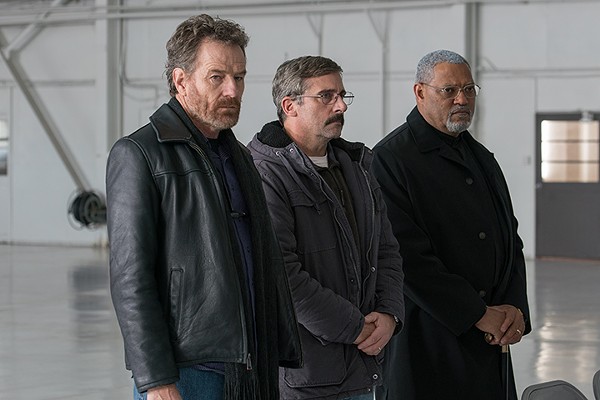Last Flag Flying
Last Flag Flying, 2017, 2 stars
Half-mast
Last Flag flies too low
From The Orlando Weekly, November 22, 2017
Richard Linklater’s Last Flag Flying is a double follow-up. It’s the director’s first drama (or dramedy, to be precise) since his Oscar-winning Boyhood, and it’s an unofficial sequel to Hal Ashby’s 1973 anti-war classic, The Last Detail. It’s a disappointment on both levels.
Though it hasn’t aged particularly well, The Last Detail remains a film-school favorite for its irreverent, social commentary. Shorter on plot than Last Flag Flying, it’s the simple story of a signalman (Jack Nicholson) and gunner’s mate (Otis Young) who escort a young sailor (Randy Quaid) to military prison for committing petty theft. They soon realize that the 18-year-old isn’t a bad guy and will end up spending the best years of his life behind bars, so they resolve to show him a good time before handing him over to authorities.
Last Flag Flying revisits the men 30 years later. They are now strangers but become reacquainted when the youngest (the former Quaid character) tracks down the other two using that coolest of new inventions, the internet. Having just lost his son to the Iraq War, he wants his two old friends to attend the funeral. The resulting trip is reminiscent of their original odyssey and both reopens and heals old wounds, while reminding us that war always comes with the highest price.
The script gives the characters different names and backstories, despite the fact that it’s based on the 2012 novel by Darryl Ponicsan, who also wrote The Last Detail and co-write this screenplay with Linklater. Instead of the three meeting on the aforementioned assignment, it’s suggested that they met and served together in the Marines in Vietnam. In this respect, it’s more of a philosophical sequel. In fact, the new film might be better appreciated if you haven’t seen The Last Detail, especially because you then might not realize that hopelessly hammy Bryan Cranston is doing a bad impersonation of Nicholson.
“You were a hazard when you were a younger man,” Cranston’s character is told. “Now you’re just an old fool.”
That’s a valid criticism of the Nicholson/Cranston character, and it’s also a worthwhile comparison of the two actors, as the former brought an edginess while the latter is just annoying. An effectively subtle Steve Carell plays the Quaid role, Laurence Fishburne takes on Young’s character, and Cicely Tyson gives the film its most profound moment. Though they are all better than Cranston, they can’t compensate for the latter’s flaws, not to mention the clunky dialogue, heavy-handed score, long runtime and general tedium, all of which betray the wasted weightiness of the subject.
Most frustrating is that the premise and basic story are wonderful and forever timely, especially if your life has been scarred by war. The Last Detail has been begging for a sequel, and though it would have been fascinating to see Nicholson and Quaid reprise their roles, it wouldn’t have been practical. Young died in 2001, and because this film take place in 2003, Nicholson and Quaid are now too old. But Cranston is no Nicholson, and the tonally challenged film lands awkwardly somewhere between comedy and drama, and nowhere near the poignancy toward which it was striving.
© 2017 Orlando Weekly / MeierMovies, LLC
